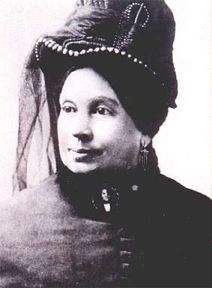Also new to me was enjoying reading about the Civil War. I've never been much interested in battlefield history which is all I have come across so far, but each member of the family was heavily affected by the war so it gave so much personal interest. John Tyler was president of the peace conference in early 1860 at the end of James Buchanan's presidency to try to avoid war. But once John Tyler talked to Abe Lincoln in secret several weeks before his inauguration, John knew peace was hopeless and began planning Virginia's cessation. He even was elected to the Confederate congress. However, John passed away before the war was over. Later, his son Gardie would say John was lucky that he did not have to try to live in post-war South. Gardie fought in the war as a teenager and never gave up hoping that the South could try again to conquer the Yankees.
Julia was greatly affected by the war personally and financially. She fled the south to take her younger children to safety with her mother on Staten Island. (The two older boys stayed in school in the south.) This escalated the friction in the crowded house since Julia's brother David was also living there. David was a die hard Yankee and political discussions were heated- so heated that David once knocked Julia to the floor! After that Julia's mother ordered David and his wife out. They never made peace in their lifetime. After their mother died, David contested the will which had left much to Julia and they went to court after court to sort it out.
 |
| Julia Tyler |
Financially the war ruined Julia. Her vacation home, Villa Margaret, was occupied by the Union soldiers who turned it over to the American Missionary Society who used the property for a "Negro school" complete with little shacks for houses all over the grounds. After the war, Julia wrote letter after letter and went to different courts to sort out who had the authority to kick the missionaries out and give her her property back. When she finally got possession of the property back, it was so ruined that she didn't even want it anymore. She tried to sell it to the government but that did not work. She ended up selling it privately for less than a third than it was worth before the war.
Sherwood Forest, her plantation, was also ruined by former slaves who came into the property and smashed and broke everything then lived in it until Julia's teenage son came and took it over to attempt to farm it with a couple of farm hands he could find for hire. But working men were scarce and supplies were expensive. And the son was only 16 when Julia left Sherwood Forest in his care! Julia tried to sell it but there were no buyers. The children were glad that their home was still theirs reminding them of happier times.
In all honesty, the Tylers, like other Virginia plantation presidents before them, did not have financial problems solely because of the war. It was solely because they did not "act their wage." They had the appearance of wealth, but mostly just had debt. Instead of saving money, John would "play the lottery" with land speculations in Kentucky and California. Julia loved to throw huge parties and she loved shopping for clothing. John would not tell her no. She just bought what she wanted and he borrowed from one bank to pay the other bank. Like when their vacation was coming up she went out and spent $500 on new dresses! Even after the war when her properties and plantations were ruined she was sending her sons about 20 cents a week spending money during college which did not curb their spending, but caused them to rack up debt. At the same time, she went and spent $700 on clothing and shoes for herself! Even today that is an outrageous amount for clothing. So, do I feel bad for her that her properties were ruined? Yes. But at the same time, she never really did handle money properly and she lived the consequences of that her whole life.
Julia was only first lady for one social season, 1844-1845, but it was a glorious one! The author says it was not matched until over a hundred years later. For her grandest party, she had her sister, Margaret, hand write over 2,000 invitations! Since Congress was still not giving John Tyler any stipend for White House expenses all was paid for by the Gardiner family.
Julia actually referred to her time as first lady as her "reign." Not in jest, but she actually called it that. She had taken a European tour before she was married which obviously influenced her view of the rulers of a nation. Julia even had a court composed of her sister, some cousins and friends. At balls she would arrive fashionably late, seat herself in a comfortable chair, and have her ladies stand around her. But her court was a sensation with the men in Washington and they enjoyed flirting and dancing with them. Julia was a huge flirt and had several offers of marriage in Washington before falling in love with John Tyler.
Those were her glory days and she loved to relive them. Even in her last years, she took an apartment in Washington and enjoyed the attentions from the newspapers and those who remembered her "reign."
 |
| Reverend Father Patrick F. Healy, S.J. guided Julia in investigating the Catholic Church. He was later president of Georgetown College. |
Also unusual about Julia was that she converted to the Roman Catholic church at age 52. When the war was over she was trying to decide where to send her children to school. Schools in the south were closed and she certainly wouldn't send them in Yankee territory! Her two older sons went to Germany, but her oldest daughter went to a convent in Nova Scotia and had such a wonderful experience. In all the tumult of Julia's life, she investigated the Roman Catholic church and was drawn to its stability and order. Makes sense since her whole life had been turned upside down by the war and financial uncertainty. It also gave peace to her soul as she grieved so many who were close to her including her beloved daughter, Julie, who died in childbirth at 21. At first, she sent Roman Catholic literature to all her family and friends and tried to convert them all, but ultimately she let them be and was content with her faith. The next president or wife to be Roman Catholic would be JFK.














